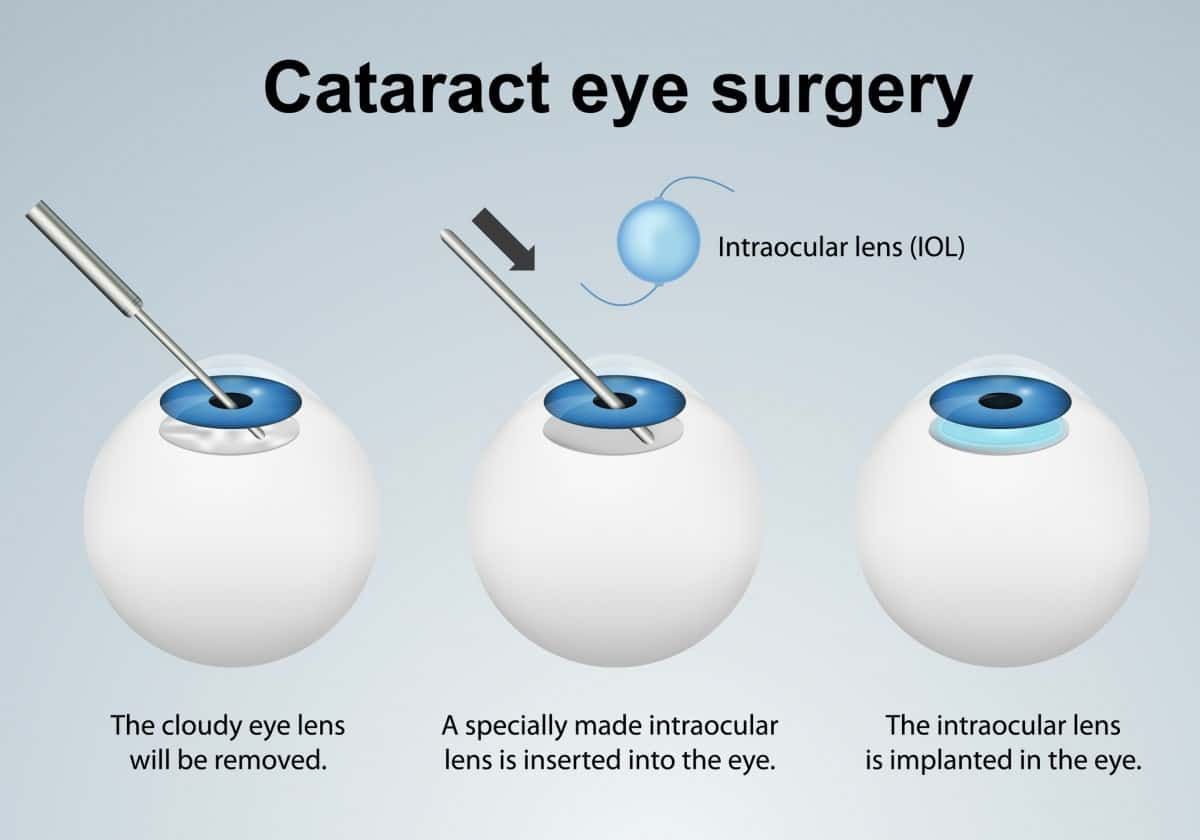3 Main Types of Lens Implants for Cataract Surgery
Cataracts are a common affliction in older adults. In fact, 24 million Americans over the age of 40 struggle with cataracts.
As we grow older, the lenses in our eyes become more rigid, opaque, and thick. The proteins and fibers inside the lenses begin to break down and cloud our vision.
Fortunately, there is a simple, safe, and effective solution with cataract treatment. Every year, 3.5 million Americans with cataracts elect to have cataract surgery.
Deciding to get cataract surgery is easy, but choosing the right type of cataract surgery lens replacement can be difficult. From the different types of intraocular lenses to what to expect during surgery, this article has it all.
What Causes Cataracts?
The most common causes of cataracts are aging and injury. There are also some genetic disorders that can increase the likelihood of developing cataracts.
If you’ve previously had eye surgery, have diabetes, or use steroids long-term, you may also experience a higher risk of developing cataracts.
Signs of Cataracts
Cataracts cause cloudy and blurred vision. The most common symptoms include sensitivity to light, double vision, and fading colors. If you notice increased difficulty reading or seeing at night, it could also be cataracts.
How Cataract Treatment Works
The treatment for cataracts is a minor outpatient surgical procedure. It involves making a small incision in the cornea and inserting a probe that breaks up and removes the cataract.
The cataract gets replaced with an artificial intraocular lens implant. The entire procedure takes about 15 minutes and requires very little recovery time.
Types of Cataract Lens Implants
An intraocular lens (IOL) is an implant that replaces the natural lens. It creates the same focusing ability as the natural lens but solves the problem of cataracts without the need for glasses or contacts.
IOLs are made out of synthetic materials like acrylic, silicone, and other types of plastic. They are all safe and will not harm any part of the eye.
Still, choosing the right IOL for your vision and budget can be a challenge. It is important to make an informed choice in consultation with your ophthalmologist. Here are the different types of lenses explained.
Monofocal Intraocular Lens
The most common type of IOL is a mono-focal lens. Monofocal lenses provide the best possible vision at a single distance. They do not correct vision issues like astigmatism or presbyopia.
Monofocal lenses are ideal for driving, walking, and seeing at a distance. They are less effective for reading and working on a computer.
Insurance does not cover all types of IOLs, but most insurance companies and Medicare cover the cost of mono-focal lenses.
Multifocal Intraocular Lens
A multifocal IOL is a premium lens that improves both distance and near focus. With multifocal lenses, you will be able to see both near and far. They are the equivalent of wearing bifocal or trifocal glasses.
Multifocal lenses can also correct intermediate vision. They have multiple zones that are set to a variety of focusing powers. You will be able to work comfortably at a computer, read, or see far in the distance with these lenses.
Because they are premium lenses, not all insurance companies cover multifocal lenses. They are generally more expensive than mono-focal lenses.
If you have vision loss due to glaucoma or macular degeneration, multifocal lenses could actually make your vision loss worse.
Toric Lenses
If you have astigmatism, toric lenses are the right choice for you. Astigmatism happens when the cornea of the eye has the shape of a football rather than a sphere. This causes the focusing power across the eye to vary.
Toric lenses can correct astigmatism, short-sightedness, and long-sightedness because they balance the focusing power of the eye. People with moderate and severe astigmatism benefit from these lenses.
What to Expect During & After Cataract Surgery
Cataract surgery is a simple, safe, and convenient procedure. It does not require a hospital stay and it only takes a few minutes. The procedure also boasts over a 90 percent success rate. Here’s what you can expect during the procedure and during the recovery period.
Before you go into surgery, a nurse or doctor will dilate your pupils with eye drops. Then your surgeon administers anesthesia to numb your eye.
The surgeon makes a small incision in the cornea and inserts a probe using a process called phacoemulsification. The probe sends ultrasonic energy to the cataract area to break it up.
Once the cataract is destroyed, the probe removes the remnants. Then The surgeon inserts the intraocular lens of your choice into the space where the cataract used to be.
When the procedure is over, the surgeon will apply a bandage and a shield over your eye for protection. It is unlikely you will need stitches. The wound essentially heals on its own.
You will need to wear the shield overnight. Your vision will improve noticeably within a day or two, and your eye will heal completely within a few weeks. You will be able to function and do most of your regular activities the following day.
Cataract Vision Services
Once you’ve decided to change your life by getting cataract surgery, you’ll need to choose which type of intraocular lens is best for your type of vision.
The most common IOL is the mono-focal lens, but you’ll get better quality of vision with a multifocal lens or an extended-depth-of-focus lens. If you have astigmatism, the best choice is the multifocal toric lens.
Are you ready to get cataract treatment you can trust? Contact the Vision Center of New York to book an appointment today. Dr. Gary Fishman and Dr. Simon Wu have extensive training in the field of premium cataract surgery in New York. With over 30 combined years of experience, they take pride in their experience and help patients improve their vision.
Distribution Links +
- wicz.com
- ktvn.com
- htv10.tv
- wboc.com
- rfdtv.com
- snntv.com
- central.newschannelnebraska.com
- metro.newschannelnebraska.com
- southeast.newschannelnebraska.com
- northeast.newschannelnebraska.com
- plattevalley.newschannelnebraska.com
- panhandle.newschannelnebraska.com
- rivercountry.newschannelnebraska.com
- wrde.com
- wpgxfox28.com
- lifestyle.mykmlk.com
- wtnzfox43.com
- lifestyle.3wzfm.com
- lifestyle.bigtalkerradio.com
- lifestyle.rewindmymusic.com
- lifestyle.koltcountry.com
- lifestyle.967thewolf.net
- lifestyle.southernsportstoday.com
- lifestyle.thepodcastpark.com
- lifestyle.680thefan.com
- lifestyle.xtra1063.com
- lifestyle.953hlf.com
- lifestyle.rewind1019.com
- lifestyle.us983.com
- lifestyle.countrylegends1059.com
- lifestyle.967wshv.com
- lifestyle.1045thedan.com
- midplains.newschannelnebraska.com



